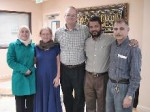Instructor promotes Al-Arian documentary

Sami Al-Arian, a former professor in USF’s College of Engineering who was arrested in 2003 on charges of supporting the Palestinian Islamic Jihad, will face a grand jury either today or Tuesday for refusing to testify in a hearing that took place Thursday.
His case has received renewed national and international attention, partly thanks to a documentary being promoted by a former USF staffer.
Mel Underbakke, former instructor and research assistant in the College of Education at USF, is touring the country screening the film, USA vs. Al-Arian. The film focuses on the effects of the five-year trial on Al-Arian’s family.
Underbakke taught English as a second language at USF from 1983 to 2007. After leaving USF, Underbakke taught at Hillsborough Community College for a semester but took this semester off to show the film. The tour is sponsored by the Social Action Committee of the First United Church of Tampa and the Plant City-based organization Friends of Human Rights.
Underbakke and Al-Arian met when Underbakke taught at the English Language Institute at USF. The institute had many Middle Eastern students, and Al-Arian often visited them. In addition, Al-Arian’s mosque and Underbakke’s church collaborated on events. She is also close friends with Al-Arian’s wife, Nahla.
The documentary was directed by Line Halvorsen and produced by Jan Dalchow, two filmmakers from Norway. The filmmakers met Al-Arian and his wife at a screening of a film about Palestine at the First United Methodist Church in Tampa. Coincidentally, the filmmakers happened to be in Tampa during Al-Arian’s trial, and they became interested in the case.
Al-Arian’s daughter, Laila Al-Arian, said the film does a good job of depicting the effect of the trial on her family.
“We felt like it really did accurately portray the case. I think the director did a good job in explaining the situation, which can be kind of complicated for people who never heard of my father and the case,” she said.
Underbakke, who attended Al-Arian’s trial, described him as someone who built bridges.
“Right after 9/11, he invited a lot of churches to programs at his mosque. He organized an interfaith memorial service,” she said. “He did outreach a lot.”
Rev. Warren Clark, of the First United Church in Tampa, worked with Al-Arian on several social justice issues in the community. He describes his friendship with Al-Arian as a “privilege.”
“The real privilege is that when he was on trial here on Tampa, I had the privilege of visiting with him each week in the jail during those 15 months,” Clark said. “I got to know him and his family members very well. I also organized about 15 members of the clergy to visit with me so that people got to know him as a human being and not just the person that the media hounded on.”
The film, Underbakke said, deals with issues of critical importance to Americans.
“I think the film is very important because you can see from the film that Sami’s rights are not being given to him here. It also addresses the fact that this is happening to a lot of other people, and it could happen to many more,” she said. “I think it’s important that Americans realize what’s happening and speak about it.”
The tour includes stops in Kentucky, Maryland, Florida, Texas, Arizona and California, and Underbakke plans to take the film to Nevada, Oregon and Seattle as well. Underbakke said that the screening in Tampa – sponsored by the Council on American Islamic Relations – received a standing ovation from its sold-out audience. It was also shown at the University during the fall to a sold-out crowd of 350 in the ballroom.
Al-Arian is taking part in a third hunger strike, forgoing food and water, which began March 3. His lawyer said that he has lost 30 pounds since starting the fast and is showing signs of “advanced dehydration,” according to the New York Times. Underbakke said Al-Arian’s strike is the result of frustration related to his arrest and sentencing.
Laila Al-Arian said the family is worried about his health. “We’re all very worried about him, but we all understand why he has to do what he’s doing. It’s not unprecedented for a political prisoner to go on a hunger strike,” she said. “He went on a hunger strike last year and lost 55 pounds. He looked like a Holocaust victim, so thin and so frail. It wasn’t until he really put his life in danger that we convinced him to stop.”
Underbakke is one of the few faculty and staff members at USF who has come forward in support of the former professor.
“I think everybody was afraid to say anything, especially when he was arrested. People knew he was innocent, they were still afraid to say anything,” she said. “You hear from a lot of people that work there that they’re afraid to say anything.”
The film has received several awards, including Best Documentary at the Norwegian Documentary Film Festival in 2007 and Best Film at the New Orleans Human Rights Film Festival in 2007.
Laila Al-Arian hopes USF students will take an interest in the case.
“I think they should become involved because he was a professor there,” she said. “He spent so much of his life educating people and educating students, and the least we can do is fight for him and defend his rights. This case isn’t about Palestine or Israel anymore, or any statement my father made. It’s about the rule of law.”






